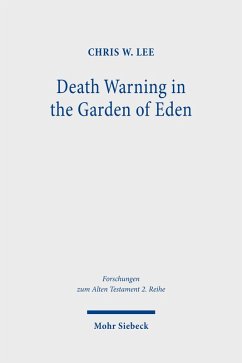In this book, Chris W. Lee examines the early Jewish reception of the divine death warning (Gen 2:16-17) in relation to its interpretative association with the introduction of physical death to humanity. The long-time rationale has been that the eating of the tree of the knowledge of good and evil brought sin and death 'for in the day that you eat of it, you shall surely die' (Gen 2:17). In this study, the author begins by examining the meaning of Gen 2:17 in its original context, then tracing its interpretation in subsequent Second Temple Jewish Literature. He examines the Greek translation of Gen 2:16-17 and its translational elements that expand the possible range of understanding of the death warning that would not have originated from the Hebrew text of Genesis. Chris W. Lee then continues with an exegetical analysis of allusions and references to the death warning in the Dead Sea Scrolls, the Book of Ben Sira, 1 Corinthians and Romans. He argues, firstly, that there are no explicit narrative clues in the HB as to the physical status of Adam and Eve either as immortal or mortal before their disobedience to God's command in Gen 2:17, and that the death warning itself does not provide textual support for the understanding of the death warning in the sense of becoming mortal. He also argues that Paul's explicit attribution of death to the disobedience of Adam and Eve (1 Cor 15:21-22; Rom 5:12) finds its earlier traces in the course of interpretation of the aforementioned literature: 1) clarification of the meaning of the death warning, i.e. death in the sense of becoming 'mortal' and death due to the violation of the command as applicable not only to Adam, but also to Eve and other human beings; 2) reinforcement of the presumptive association between the death warning and the introduction of death to humanity. Born 1981; 2019 PhD in Old Testament and Hebrew from the University of Edinburgh; currently serving as an associate pastor at Puren-Chojang Presbyterian Church.
Dieser Download kann aus rechtlichen Gründen nur mit Rechnungsadresse in A, B, BG, CY, CZ, D, DK, EW, E, FIN, F, GR, HR, H, IRL, I, LT, L, LR, M, NL, PL, P, R, S, SLO, SK ausgeliefert werden.


